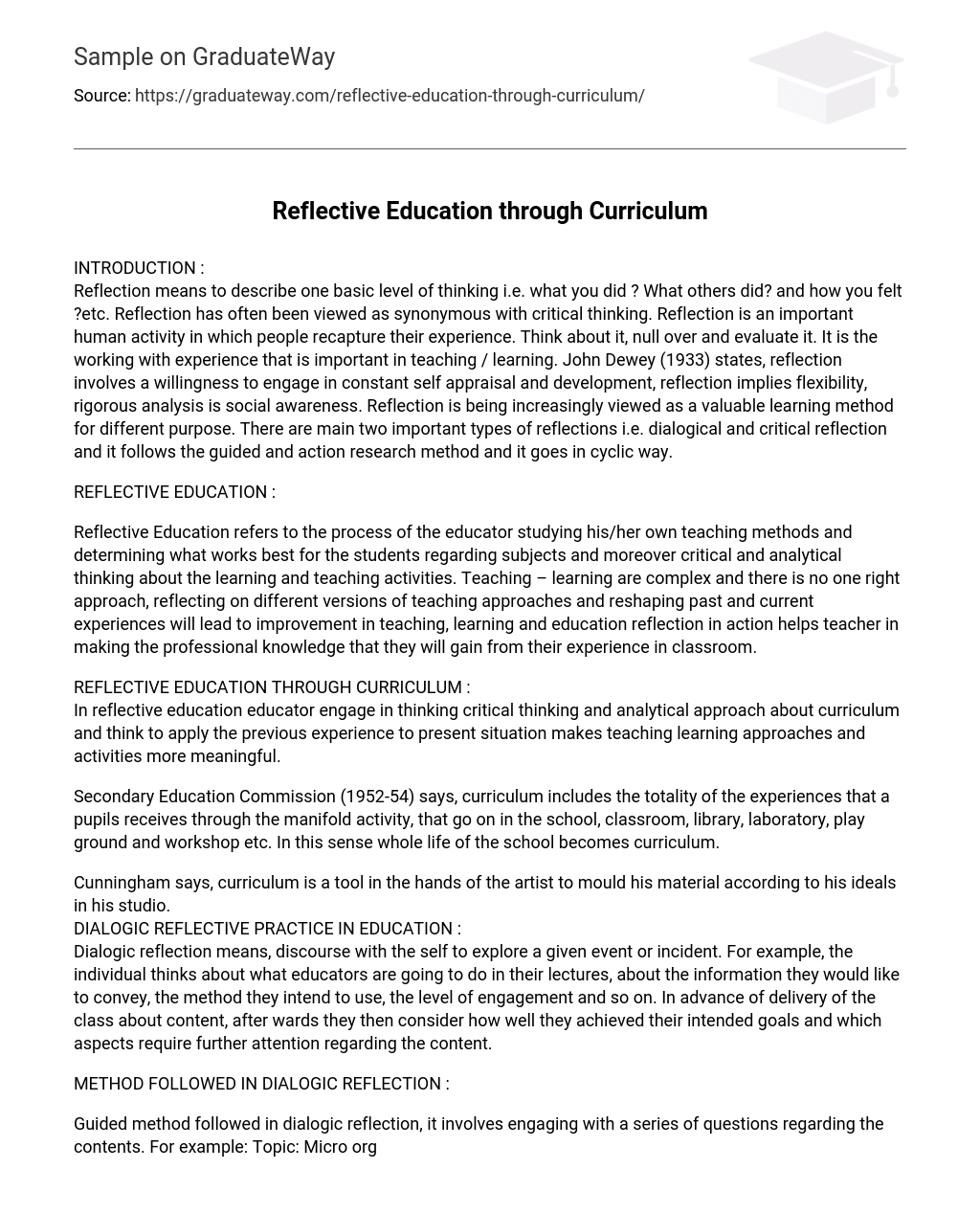INTRODUCTION :
Reflection means to describe one basic level of thinking i.e. what you did ? What others did? and how you felt ?etc. Reflection has often been viewed as synonymous with critical thinking. Reflection is an important human activity in which people recapture their experience. Think about it, null over and evaluate it. It is the working with experience that is important in teaching / learning. John Dewey (1933) states, reflection involves a willingness to engage in constant self appraisal and development, reflection implies flexibility, rigorous analysis is social awareness. Reflection is being increasingly viewed as a valuable learning method for different purpose. There are main two important types of reflections i.e. dialogical and critical reflection and it follows the guided and action research method and it goes in cyclic way.
REFLECTIVE EDUCATION :
Reflective Education refers to the process of the educator studying his/her own teaching methods and determining what works best for the students regarding subjects and moreover critical and analytical thinking about the learning and teaching activities. Teaching – learning are complex and there is no one right approach, reflecting on different versions of teaching approaches and reshaping past and current experiences will lead to improvement in teaching, learning and education reflection in action helps teacher in making the professional knowledge that they will gain from their experience in classroom.
REFLECTIVE EDUCATION THROUGH CURRICULUM :
In reflective education educator engage in thinking critical thinking and analytical approach about curriculum and think to apply the previous experience to present situation makes teaching learning approaches and activities more meaningful.
Secondary Education Commission (1952-54) says, curriculum includes the totality of the experiences that a pupils receives through the manifold activity, that go on in the school, classroom, library, laboratory, play ground and workshop etc. In this sense whole life of the school becomes curriculum.
Cunningham says, curriculum is a tool in the hands of the artist to mould his material according to his ideals in his studio.
DIALOGIC REFLECTIVE PRACTICE IN EDUCATION :
Dialogic reflection means, discourse with the self to explore a given event or incident. For example, the individual thinks about what educators are going to do in their lectures, about the information they would like to convey, the method they intend to use, the level of engagement and so on. In advance of delivery of the class about content, after wards they then consider how well they achieved their intended goals and which aspects require further attention regarding the content.
METHOD FOLLOWED IN DIALOGIC REFLECTION :
Guided method followed in dialogic reflection, it involves engaging with a series of questions regarding the contents. For example: Topic: Micro organisms. *
What most important / useful / relevant event or idea?
Definitions, structure, useful and harmful micro organisms.
*
How can be explained?
Inductive and deductive approach, demonstration method etc.
*
How is it similar to and different from other events?
Here Educator think and apply the post knowledge, experience to the present situation regarding content.
*
What I have learned from this?
Educator learns thinking about the micro organisms, gaining experiences and able to share the experiences.
*
How does this mean for any future situations?
This means help in sharing experiences.
These questions can be designed by the educators themselves and serve as a guide through
the reflection process. These types of questions help to educator to explore and reconsider your motivational or rationale for your actions.
CRITICAL REFLECTIVE PRACTICE IN EDUCATION :
Critical reflection refers to efforts to accounting for the broader, historic, cultural and political values in framing practical problems to arrive at a solution. Critical reflection helps transformational learning that can be happen either gradually in from a sudden and it after the way people see themselves and their world.
METHOD FOLLOWED IN CRITICAL REFLECTION :
The method applied in critical reflection is action research. This involves systematically changing the teaching, using on the ground evidence that suggests the changes, you make are in right directions and enhancing student learning. This Method goes in an analytic way of content and finds the solution. The target of the action research is the teacher and the reflection is considered transformational that the teaching is being altered as a result of the reflection and is deemed more accurate.
The educators should frame the following questions before presentation in critical reflection Example :
*
Topic : Water Pollution
What was the problem ?
Water pollution.
*
What was/were the cause/s of the problem ?
Educators analyze the cause of water pollution, drainage water, industrial waste etc.
*
How did you deal with the problem then ?
Here educator implies the steps of action research
i.e. stating problem, data collection, analysis and interpretation.
*
How did your solution to the problem relate to your theory of teaching – learning After going through the action research to the problem to come conclusion i.e. industrial waste is main cause for the water pollution.
CONCLUSION :
Reflection means think about your past knowledge, experience to the present situation. It may be the simple or critical both are beneficial in the teaching, learning process, Educator understands their own style, abilities skill etc. and learner also know themselves.
In present
scenario, Reflection Education has many advantages in teaching learning process. i.e. Educator goes good profession development and learners learn effectively only it is used in real practice through curriculum.





